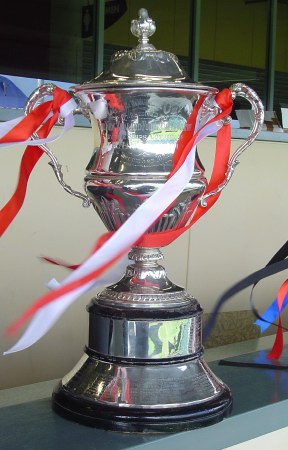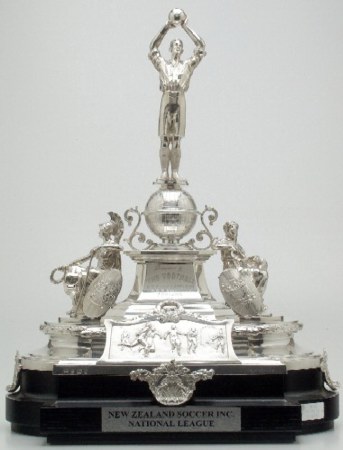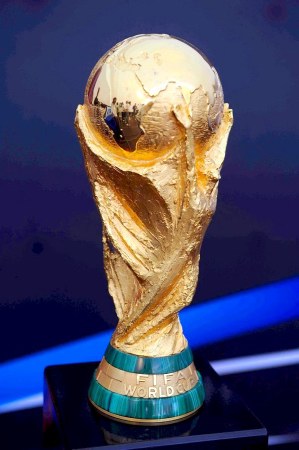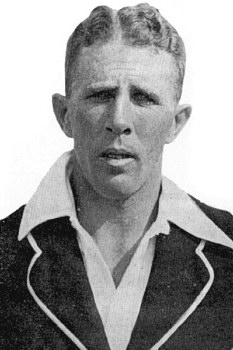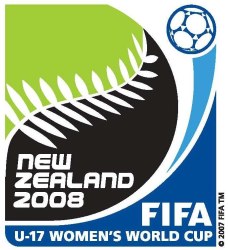The Ultimate New Zealand Soccer Website | home
NZ Soccer Calendar | National Teams | Rep Football | NZSMA | A History of New Zealand Soccer | Kiwis Overseas
A History of New Zealand Soccer
by Jeremy Ruane
Mention soccer to the average New Zealander, and they immediately associate the sport with 1982, the year a small country - human population: three million; sheep population: too many to mention! - took on the cream of the footballing world at its most prestigious tournament, this despite soccer not being the country's number one code.
The Road to Spain, as New Zealand's qualifying campaign came to be known, was an arduous one, to put it mildly. Traditional foes Australia were the major obstacle in the Oceania qualifying zone, which also consisted of Taiwan, Indonesia and Fiji, a team routed 13-0 by the All Whites, then a record score in World Cup soccer.
For most countries, finishing top of your World Cup qualifying zone guarantees automatic entry to the sport's quadrennial coming together of its finest exponents. Not so for Oceania's premier nation, however. Instead, further play-offs are scheduled, more often than not against Asian representatives.
Thus New Zealand found themselves taking on the cream of Saudi Arabia, Kuwait and the People's Republic of China in a further qualifying group, with the top two nations securing the last berths in Spain. And after six round-robin matches apiece, New Zealand and China were locked together in second place, forcing a play-off in the neutral territory of Singapore on January 10, 1982, the means by which one nation would experience agony, the other ecstasy.
Contrasts dominated. East versus West. The old versus the new. The world's most populous nation against a true minnow in the global scheme of things.
As it turned out, size mattered not. Nor age, nor compass point. What did, for some 650,000 Kiwis watching their television screens into the wee small hours of the following morning, was a 24th minute strike from "the lethal left foot" of Steve Wooddin, and a twenty-five yard wonder volley two minutes into the second spell from Wynton Rufer, a then nineteen-year-old striker who has since gone on to become the greatest player in the history of soccer in Oceania.
Those two goals gave New Zealand a 2-1 victory over China, and the final berth at the first-ever twenty-four nation World Cup Finals, the draw for which pitted the minnows against the almighty - Russia, "King" Kenny Dalglish and Scotland, and the one nation on earth which, more than any other, people associate with the game the world plays ... Brazil.
History shows that New Zealand made an early exit from Spain '82, but, as then New Zealand World Cup director and now Honorary President of the Oceania Football Confederation, Charlie Dempsey, said upon the squad's return home from the play-off, "Singapore was our World Cup Final. We have won our World Cup".
That success also marked the perfect way to celebrate a century of soccer in New Zealand. True, the New Zealand Football Association - nowadays New Zealand Soccer - wasn't formed until 1891, but the sport had been a part of the New Zealand way of life since the early 1880's.
That said, it wasn't the nation's premier sporting code in the eyes of the masses, for soccer had failed to capture the imagination of the public in this country in the way in which the more physically demanding but less cerebrally challenging sport of rugby union had done so.
It did so in 1981, however, a quite timely event too, in more ways than one. For the successes of the "All Whites", as the national soccer team was affectionately and, in hindsight, somewhat ironically known as they embarked on their "Spanish Conquest", played a part in unifying a nation split fair down the middle between displaying its pride and loyalty to its national sport, and condemning the apartheid-oriented ways of the South African government, whose national rugby team, the Springboks, were scheduled to tour New Zealand.
As a result of playing a then-record fifteen matches to qualify for the 1982 World Cup Finals, New Zealand's representatives had clocked up some 70,000 air miles en route - more in one year than had been amassed in the first sixty-odd years soccer had been a part of the nation's sporting interests.
Indeed, up until the Second World War, in fact, New Zealand's involvement in the footballing world was largely confined to any number of matches against Australian opposition on either side of the Tasman Sea.
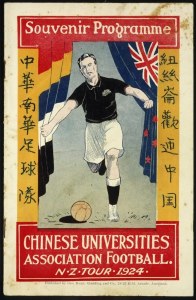 Only the visits to our shores of Chinese Universities (1924 above), Canada (1927) and England Amateurs (1937) provided some semblance of variation from the trans-tasman footballing diet with which New Zealand had, to this point, contented itself.
In the years immediately following the war, a visit to these shores by South Africa, in pre-apartheid days, was the highlight, with one of the quirks of this four-test series being that each international took place on what, today, are the four premier test rugby venues in this country!!
The early 1950s saw New Zealand significantly broadening its footballing horizons, with a string of trips to a number of our South Pacific neighbours, most notably New Caledonia, Fiji and Tahiti, taking place. The latter part of that decade saw the first visits to these shores of leading UK and European selections and club sides, visits which continued off and on until the late 1980s.
FK Austria were the first club of this contingent to visit, in 1957. Four years later, an English FA XI led by Tom Finney handed out a footballing lesson to their Antipodean cousins, while Manchester United came a-calling in 1967.
Eleven years later, England B toured New Zealand, with the League of Ireland and Watford (both 1982), Newcastle United (1985), a Russian XI (1986), Dynamo Minsk (1987) IFK Gothenburg and Young Brazil (both 1988), Lokomotiv Moscow (1990), England (1991) and Werder Bremen (1992) others to make visits of significant duration to these shores for series against the national side.
1964 saw New Zealand make its first major overseas tour - a fifteen-match extravaganza which took in Asia, England and Europe, finishing in the USA. Another fifteen years were to pass before this trek was repeated, the national side this time limiting itself to ten matches against Middle East and UK opposition.
A further such journey, to Fiji and the UK, was made in 1984, with an all-UK tour taking place in 1992. Both these tours were eight-match affairs, while more recent tours to South America via Tahiti (1995) and the Middle East (1996) have, respectively, boasted six-match and five-match schedules.
In the immediate aftermath of New Zealand's success in qualifying for the World Cup Finals, numbers playing the game simply sky-rocketed, particularly at junior level. In some ways, this sudden surge of interest caught those involved in soccer in this country on the hop, and it has to be said that little was done to fully capitalise on this country's greatest footballing achievement.
Save for one thing - the introduction of a Centres of Excellence programme which, while providing little benefit initially, has reaped rich rewards in recent years. This was most evident in 1997, when New Zealand's Under-17 squad qualified for the Junior World Cup Finals in Egypt. Unlike in 1982 however, the youngsters were nowhere near as competitive as was hoped, a fact underlined by a 13-0 hiding at the hands of Spain in round-robin play.
Two years on, and the next batch of youngsters off the Centres of Excellence production line did heir country proud at the 1999 World Junior Championship of Football, this time on home turf here in New Zealand.
It's a competition the local footballing public was very much looking forward to hosting and being part of, with tournament organiser Bill MacGowan and his team having moved mountains to get things on track, after a much publicised "on again - off again" saga revolving around whether this country could actually afford to host this prestigious FIFA tournament.
History will show that Brazil ousted Australia on penalties in the final of the tournament, and it will also show New Zealand having recorded its first-ever win at this stage of a FIFA tournament - a 2-1 triumph over Poland.
And while the scoreline of the Brazil v. Ghana semi-final will forever appear in the record books, what cannot be emphasised by statistics is that this was unquestionably the greatest soccer match ever seen in this country - so impressed with the standard of football on show in this magnificent game were the FIFA officials present that the day after, they decreed that a copy of the match video was to be sent to every one of its 203 member associations.
Much of the public interest in this event was aroused by the All Whites' participation in the 1999 Confederations' Cup Finals in Mexico, where New Zealand ran the USA, European champions Germany and the runners-up at France '98, Brazil, close in their three group games, performances which did the players concerned, and soccer in this country as a whole, no end of good.
To qualify for this event, it meant conquering our great rivals from across the Tasman once again, on their own patch. Australia did not treat the Oceania Nations Cup competition with the respect it deserved, and paid the price for selecting a solely Australian-based squad - not one of their own overseas-based professional contingent was called upon by the Socceroos.
How the All Whites, and the New Zealand soccer public, enjoyed Mark Burton's 24th minute goal in the tournament final in Brisbane as a result!! It was a memorable victory, by far bettering the two-legged Trans-Tasman Cup triumph over Australia recorded in 1987, as the rewards on this occasion were far more substantial, both financially and in terms of prestige and recognition on the world stage.
The squad which represented New Zealand on this stage features more overseas-based professionals than ever before, another of the benefits to be had from the Centres of Excellence programmes. New Zealand internationals are now plying their trade in nations as far-flung as Iceland, Singapore, South Africa, Australia, England, Belgium, the USA and Germany, as well as here at home.
Soccer in New Zealand has benefitted greatly from the involvement of any number of key people over the years, and of those, a handful are deserving of greater recognition than to merely be mentioned in dispatches.
Foremost among this elite group is Ken Armstrong, who, soon after helping Chelsea to win the 1954-5 English League championship, brought his family across the seas to settle, initially, in Gisborne. There is no debate necessary as to how great was his influence in New Zealand soccer throughout the 1960s and 1970s - quite simply, there was none greater.
Armstrong revolutionised the game in this part of the world, primarily in a coaching role. He introduced modern-day tactics to New Zealand soccer, and established a platform from which the game in this country has gone forward in leaps and bounds.
Sadly, Ken passed away in 1984, but has left the game in this country a great legacy in the form of son, Ron, one of this country's greatest-ever players who, nowadays, is co-coach of New Zealand's Olympic (Under-23) squad.
Another individual who needs no introduction is Charlie Dempsey, another member of the "British Invasion" to New Zealand in the 1950s. Administration is his forte, and, like Armstrong, he has utilised his astuteness behind the scenes to great effect for football in this country.
Initially involving himself in Auckland soccer, Charlie went on to fulfil national administration duties, culminating in his elevation to the chairmanship and, later, the presidency of the NZFA. At the same time, he involved himself in the affairs of the Oceania Football Confederation from day one in 1966, and is now the OFC President, as well as a member of the FIFA Executive Committee, where he is highly respected by his fellows in the game's world governing body.
It is appropriate to mention both John Adshead and Kevin Fallon in the same breath, because both have enjoyed individual spells at the helm of the All Whites without as much success as both would have preferred. But when operating in tandem for the 1982 campaign ... to quote Bill Shankly, "they conquered the bloody world!!"
Adshead was very much the front-man of the duo, the public face of the game in this country at a time when soccer was perfectly placed to make great in-roads into the nation's infatuation with rugby. As well, he was an excellent motivator, as evidenced by a quote from Adrian Elrick, one of the '82 All Whites - "If John Adshead asked the players to go out and die for him, not one of them would hesitate".
Fallon, meanwhile, was the coaching expert, a born-and-bred Yorkshireman who is regarded by many as the taskmaster's taskmaster - "uncompromisingly honest" is Adshead's description of his coaching partner. Very thorough in his preparation of players, Fallon is currently overseeing New Zealand's Under-17 World Cup programme, as well as carrying out various coaching duties in his role as the Oceania Football Confederation's Technical Director of Coaching.
On the park, Wynton Rufer's achievements speak volumes for his dedication, often at the expense of playing for his country. His exploits in Switzerland, Germany - he won honours galore at Werder Bremen - and in Japan have earned him many kudos, particularly in the footballing hotbed that is Europe.
In New Zealand, however, he is somewhat misunderstood by the local footballing public, who struggle to perceive how Rufer, given the success he has achieved on the world stage, and the fact that, when called upon to play for the All Whites, was more often than not unavailable for selection, now wishes to draw on his experiences in order to put something back into the game in this country.
To this end, he was appointed player-coach for the first two seasons of the fledgling Auckland-based Football Kingz club, a New Zealand entry which has participated in Australia's National Soccer League competition since October 1999. At the same
|
Click the pics below to read about
the history of each competition
Thanks are due to Andre Zlotkowski and the Christie family for the archive photos which appear below
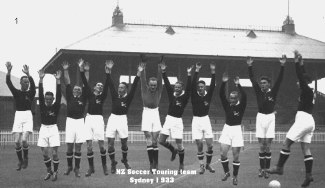 New Zealand perform the haka prior to their first match on the 1933 tour of Australia, against NSW,
which the home team won 5-0.
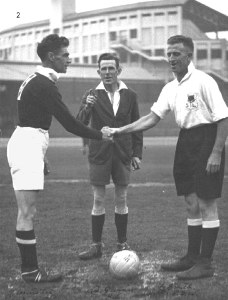 NZ captain Jim Christie (black shirt) shakes hands with his New South Wales counterpart at the toss.
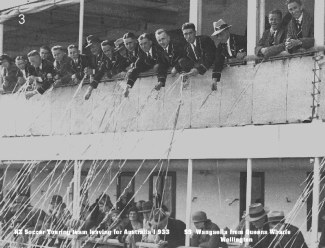 New Zealand depart on the SS Wanganella for their Australian tour in 1933
 New South Wales line-up pictured prior to handing the touring New Zealand team a 5-0 hiding
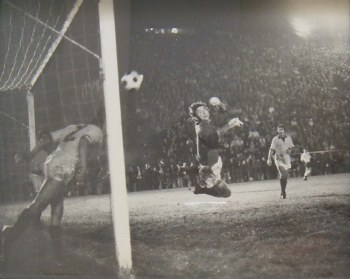 New Zealand hosted the inaugural
FIFA U-17 Women's World Cup Finals.
Click the logo to read about the history
of New Zealand women's soccer
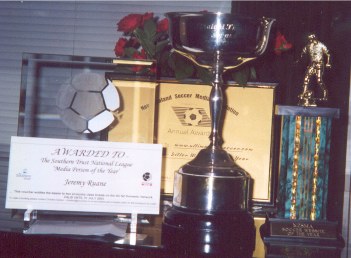 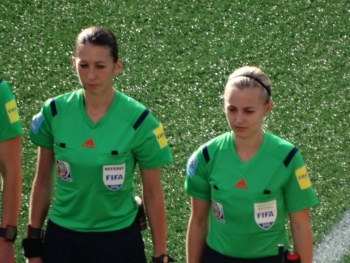 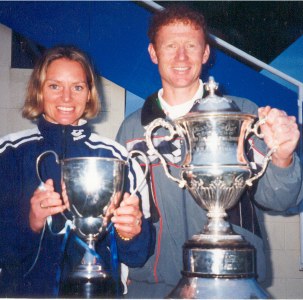 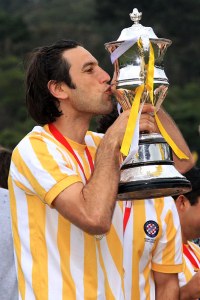 Ivan Vicelich
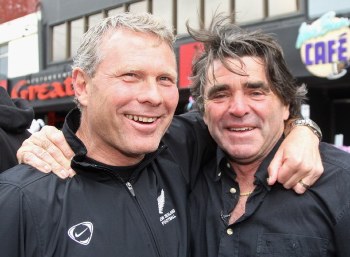 Ricki Herbert and Kevin Fallon
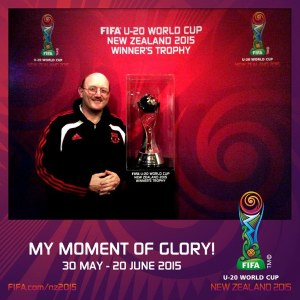 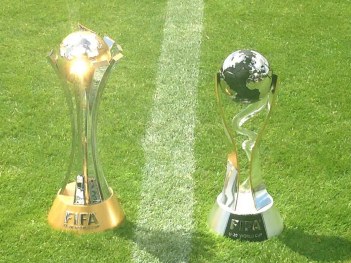 The FIFA Club World Cup and the FIFA U-20 World Cup together on NZ soil
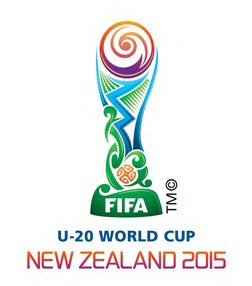 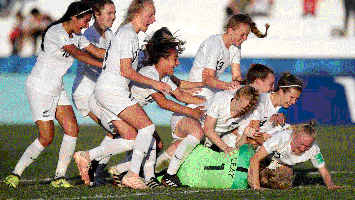 The 2018 Young Ferns celebrate clinching third place in Uruguay
|
time, he is focusing his coaching energies on placing more emphasis on the development of junior footballers, with whom he enjoys great affinity.
The early years of the coming millenium promise to be exciting ones for soccer in New Zealand, with so many things having happened in the game in this country in the last year of the twentieth century. To mark the new century, the All Whites won the Merdeka Cup, Malaysiaís annual international tournament.
This went some way to making up for losing their crown as kings of Oceania, Australia emerging triumphant at the Oceania Nations Cup tournament in Tahiti, and also conquering both the Youth (U-20) and Junior (U-17) All White teams in the Oceania finals of these age grades, two-legged matches which had qualification for the U-20 and U-17 World Cup Finals at stake.
The Oly-Whites (U-23s), meanwhile, were edged out of a berth at the Sydney 2000 Olympic Games by South Africa, again over two legs, while the All Whites were clinically disposed of by a ruthless Australian combination in the Oceania play-off on the road to the 2002 World Cup Finals, highlighting the gulf which is opening up between the countries once again, a situation arising from any number of factors, not the least of which is New Zealandís lack of international exposure in comparison with our trans-tasman rivals.
Revenge was sweet on home turf in July 2002, however, when Australia sent an under-strength side across the pond to defend the Oceania Nations Cup. Ryan Nelsen's winner in the final secured the All Whites a trip to France for the 2003 Confederations Cup Finals, leaving our arch-rivals to shrug their shoulders and say, "C'est la vie!!"
While soccer in this country will always struggle to enjoy its fair share of the spotlight and related benefits, e.g. top-level sponsorship on the same scale as that enjoyed by the oval ball codes, thanks largely to the media's seeming preoccupation with all things rugby, there remains plenty for round-ball followers to be encouraged by at present in this area of the world.
1982 will always be a key part of New Zealand soccer's history. 1999, with our involvement in the Confederations' Cup Finals and the Junior World Cup Finals taking place in this country, was another such year of note.
2003, and another Confederations Cup Final appearance, allied to New Zealand's highest-ever ranking on the world stage - a top-fifty spot, no less - is another noteworthy entry in our ongoing chronicle. We look forward to many more.
THE INTERNATIONAL REVOLUTION
In the years immediately prior to 2005, the stewardship of New Zealand Soccer under Bill MacGowan had seen national team activity take second place to fiscal prudence in the order of priorities, an approach which did little to aid the game's development on the park.
Australia's transfer to the Asian Confederation from Oceania gave MacGowan's successor, Graham Seatter, the opportunity to redress the balance on the playing front, and while it impacted on the balance sheet status, New Zealand went from famine to feast in terms of international activity, as a plan was put in place to qualify for fourteen FIFA finals at various age levels by the end of 2010.
New Zealand has enjoyed great success in this quest, its national teams qualifying as Oceania's representatives for each of the following FIFA tournaments:
2006 U20 Women's World Cup Finals
2007 Women's World Cup Finals
2007 U20 World Cup Finals
2007 U17 World Cup Finals
2008 U17 Women's World Cup Finals (as hosts)
2008 Olympic Women's Football Tournament
2008 Olympic Men's Football Tournament
2008 U20 Women's World Cup Finals
2009 Confederations Cup Finals
2009 U17 World Cup Finals
2010 World Cup Finals
2010 U20 Women's World Cup Finals
2010 U17 Women's World Cup Finals
Only one failure was recorded, with the U20 men's squad failing to qualify for the 2009 World Cup Finals.
As well, New Zealand club teams represented Oceania at the FIFA Club World Cup Finals in each year of this cycle, with Auckland City stunning all-comers by finishing fifth in the 2009 event, conquering two professional teams en route - the best possible response to FIFA's concerns about an amateur team competing alongside professional clubs at one of their showpiece events!
Qualifying for South Africa 2010 saw the All Whites overcome Bahrain, the fifth-placed Asian nation, over two legs to secure a financial windfall (a guaranteed sum of $US 9m is the reward for each finalist) which will do wonders for the game in New Zealand, providing it is spent prudently.
And how they strutted the world stage! Three draws far exceeded the expectations of all and sundry, and while they weren't quite enough to see the All Whites progress to the last sixteen, the attributes of respectability and credibility were earned in spades.
It was a stunning effort by Ricki Herbert, Ryan Nelsen and the squad, one which captured the imagination of the nation as they returned home undefeated, just the fourth nation in World Cup history to achieve this feat while failing to progress beyond the group stages.
Doubtless there will be changes to New Zealand's qualification path for future World Cup Finals, with the prospect of Oceania's champions contesting the final round of Asian play-offs a sensible and financially lucrative option.
But while direct qualification for FIFA's numerous Finals (with the exceptions of both the Club World Cup Finals and the World Cup Finals) remains, and the obstacle which is Australia no longer blocks the path of Kiwi progress where qualification for these events is concerned, New Zealand should look to make hay while the sun shines. Long may it continue to!
It certainly did in 2011, with the Junior All Whites becoming the first national team to progress from their group as they reached the last sixteen at the FIFA U-17 World Cup Finals.
A year later, it was the turn of the Football Ferns to make history, as New Zealand advanced to the quarter-finals of a major football tournament for the first time ever.
They reached the last eight at the London 2012 Olympic Women's Football Tournament, where their progress was curtailed by the USA, who went on to claim a historic third successive gold medal in the event.
The All Whites, meanwhile, failed to build on their successes of 2010, a shock loss to New Caledonia in Honiara in 2012 quashing their FIFA Confederations Cup Finals prospects.
They progressed to the inter-confederation play-offs for a place at the 2014 FIFA World Cup Finals, but a 9-3 aggregate hiding by Mexico brought an end to Ricki Herbert's 67-game reign as New Zealand's national coach, the longest-ever tenure by anyone in that position.
The undoubted highlight of 2014 saw Auckland City capture the imagination of football around the world, as the amateurs more than footed it with the professionals at the FIFA Club World Cup Finals.
City have dominated both domestic and Oceania club football in the second decade of the 21st Century, the one consistently bright light for the men's game in New Zealand in a period during which national representative teams have struggled.
But not even in their wildest dreams did the club's die-hard fans anticipate Ramon Tribulietx's charges finishing in an incredible third place in Morocco, where they were so close to realising the previously unthinkable - a New Zealand team playing Real Madrid in the final!
They were only denied that dream fixture in extra time of the semi-final, but there was some compensation, with captain Ivan Vicelich being awarded the Bronze Ball as the third-best player of the tournament.
Meanwhile, Wellington Phoenix has flown the flag for New Zealand in Australia's A-League competition, following in the foosteps of the Football Kingz and the ill-fated NZ Knights in competing against Australia's finest.
While often falling short of expectations they occasionally exceed them - they were a game away from contesting the A-League Grand Final in 2010, for instance. They are a well-founded operation, but ironically enjoy their best home attendances when playing away from their Wellington base.
In 2015, the Junior All Whites again advanced to the last sixteen at their World Cup Finals, and only bowed out at that stage to a last-minute Brazilian penalty, having themselves missed one earlier in the game.
It was also a year in which New Zealand hosted the FIFA U-20 World Cup Finals, with the Youth All Whites progressing to the last sixteen before elimination by Portugal.
Those successes were marred, however, by a successful protest made by Vanuatu against New Zealand at the Oceania Olympic qualifying tournament, the OlyWhites being deemed to have fielded an ineligible player, South African-born Deklan Wynne.
Protests by NZ Football against this decision fell on deaf ears, with the root of the issue one of an interpretative nature regarding the rules surrounding player eligibility.
FIFA introduced an additional clause in 2008 which, it turns out, NZF hadn't taken into account in the years since, meaning there were approximately a dozen players in their various men's teams who actually weren't OK to play, even though, in some instances, FIFA had cleared them to play in their various Finals.
All in all, a crazy situation, and one which, thankfully, had no further repercussions for the game other than the OlyWhites failing to qualify for Rio 2016, although it did prompt a thorough review of NZ Football's practices and processes, with numerous improvements introduced as a consequence.
The Football Ferns were desperately unlucky to go home early from the 2015 FIFA Women's World Cup Finals in Canada, where one goal would have seen them finish either first or second in their group.
During their build-up towards Canada, Tony Readings' team scored victories over Brazil and China in Switzerland to clinch the Valais Cup in 2013, the country's first trophy-winning experience at a football tournament outside the confines of Oceania in many a year.
They weren't able to progress beyond the group stages in Rio, however, and in November 2017 Readings called time on his 82-match stewardship of the country's most consistently performed national team in recent years.
Like their seniors, the Junior Ferns and Young Ferns have continued to dominate the women's scene in Oceania, and impress on the world stage, with the older age-group team reaching the quarter-finals of the 2014 FIFA U-20 Women's World Cup Finals.
The Junior Ferns then won all four Oceania qualifying matches by double-figure margins in qualifying for Papua New Guinea 2016, with Emma Rolston scoring a record eleven goals in half a game before New Caledonia were spared her wrath during the second half of a 26-0 drubbing, the biggest ever win by a New Zealand representative team, male or female.
The All Whites, meanwhile, simply wanted to win a game, any game, having last done so in September 2013. This loss of form saw them plummet down FIFA's rankings, so much so that the penultimate tables for 2015 find New Zealand languishing in 159th place on the charts which gauge the progress of all 209 countries which play the world game.
Coach Anthony Hudson, the son of former Chelsea, Stoke City and England star Alan, took six games before recording his first win in charge, with his initial experimentation not going down too well with the majority.
His principle task was to ensure the All Whites prevailed at the OFC Nations Cup Finals in Papua New Guinea in mid-2016, thus qualifying for Russia 2017, the FIFA Confederations Cup Finals.
Throughout 2017, the Oceania World Cup qualifying matches took place, with the All Whites earning the right to take on the fifth-placed South American team, Peru, home and away for a berth at Russia 2018.
The scoreless first leg in Wellington attracted New Zealand's biggest ever crowd - 37,034 - for an international fixture in this country, but the Peruvians prevailed 2-0 on aggregate, prompting Hudson's resignation.
His replacement was Fritz Schmid, who was brought into the role by new Director of Football Andreas Heraf. When Football Ferns coach Tony Readings stepped down from the role he had fulfilled for nigh on a decade, Heraf took over that role too - the biggest mistake he will ever make in his life!
"Hell hath no fury like a woman scorned", goes the saying. When you manage to get yourself offside with an entire squad of female footballers, for employing practices which date back to the days of caveman thinking, i.e. "a woman's place is in the kitchen", etc., there is no comeback - exit Heraf, and Andy Martin, the Chief Executive responsible for his appointment.
Schmid remained, in charge of a national team with no games scheduled for over a year, as well as the OlyWhites, who only play quadrennially, by and large. The Football Ferns, meanwhile, turned to the ultra-experienced Tom Sermanni to oversee their France 2019 and Tokyo 2020 campaigns.
For which much inspiration came from the Young Ferns, who realised the dreams of many among the women's football fraternity by finishing third at the 2018 FIFA U-17 Women's World Cup Finals in Uruguay, returning home with bronze medals, a feat hitherto realised only by Auckland City FC four years earlier.
Within twelve months, the Youth All Whites produced a brand of quality football not usually associated with NZ teams at the 2019 FIFA U-20 World Cup Finals in Poland. But for a penalty shoot-out defeat in the round of sixteen, they could well have gone on to emulate their younger female counterparts' achievements.
These two teams are among the first national representative sides to boast players who have come through the Whole Of Football youth development programme, introduced at the start of the decade by then Football Ferns coach John Herdman.
If this is a taste of what's to come, the future for the game the world plays in this wee outpost of empire looks to be very promising indeed!
|
